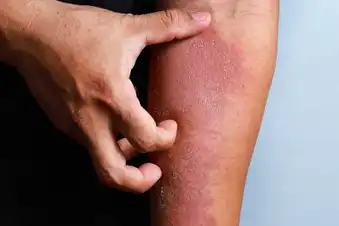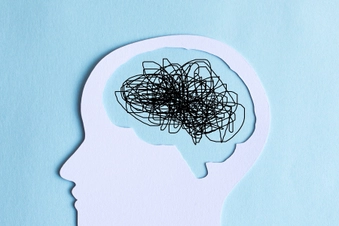Don’t Forget Your Mental Health with Severe Atopic Dermatitis

Atopic Dermatitis and Mental Health
From the discomfort of red, cracked, itchy skin and your concerns about how your skin looks to interrupted sleep and other complications, severe atopic dermatitis can do a number on your emotional wellness. Luckily, there are action steps you can take to gird your mental health as you manage your condition.

The Effect of Stress on Skin
Stress makes an impact on anyone’s body, but when you live with atopic dermatitis, the hormones your body releases in response to stress ramp up inflammation, and with it, your symptoms. Being proactive about stress management not only helps soothe your skin, but it keeps your mental wellness in check, too.

Practice Intentional Relaxation
You can lower stress – and reduce the flow of stress hormones like cortisol – when you put your body into a more relaxed state. Try deep breathing exercises while listening to soothing sounds or soft music. Look into guided meditation. Or just devote time to activities that make you happy, such as snuggling a pet or loved one, taking a lukewarm bath, or creating music or art.

Prioritize Sleep
Itchy skin can keep you up. When you don’t get enough sleep, your energy and mood suffer. This feeds the stress cycle that can make skin symptoms worse. If you’re struggling to catch ZZZs, talk to your doctor. A nighttime antihistamine might help. It can calm itching and make you drowsy. A warm bath (but not hot) may also prepare the body and mind for restful sleep. Keep your bedroom cool, dark, and free of screens and other distractions.

Get Moving
Regular exercise is a natural mood booster. Any movement, like running, walking, swimming, biking, or yoga, releases neurotransmitters and hormones that increase feelings of contentment and happiness. Keep your temperature in check during your workouts so sweat and heat don’t send your symptoms into overdrive.

Set Self-Care Boundaries
Sometimes the stress of having atopic dermatitis comes not from within but from other people. If you’re having a flare and need to focus on you, it’s OK to say no to being social. But pay attention to your isolation. If symptoms are keeping you from your normal life, it may be time to check in with your doctor.

Try Talk Therapy
Cognitive behavioral therapy is a type of talk therapy a trained counselor can guide you through to help change your thought patterns. This can change your mindset around your severe atopic dermatitis. Studies show it can help people living with long-term health conditions, such as eczema, to deal with sleep difficulties, stress, anger, and low self-esteem.

Foster Connections
There’s a saying that goes, “Shared sorrow is halved sorrow; shared joy is doubled joy.” Confiding in people you trust about the mental burden of your atopic dermatitis can help relieve you of some of the stress of living with the condition. A loved one can offer a safe space for venting frustrations and also give you an outlet for distraction.

Seek Out Support
Nearly 17 million U.S. adults live with atopic dermatitis. Sites like The National Eczema Association provide resources and connections to clinical trials, educational tools, and support groups where you can get to know others with atopic dermatitis.

Ask About Medication
Adults with atopic dermatitis have a 2.5 to 3 times higher risk for anxiety or depression, and this risk goes up as the severity of your condition does. Connection, exercise, stress relief, and support can all go a long way, but for many people, medication to treat anxiety and depression is a lifeline and helps them to get more benefit from the other tools in their mental health support toolbox.
Show Sources
IMAGES PROVIDED BY:
- iStock / Getty Images
- Moment RF / Getty Images
- E+ / Getty Images
- E+ / Getty Images
- iStock / Getty Images
- iStock / Getty Images
- Moment RF / Getty Images
- iStock / Getty Images
- Moment RF / Getty Images
- Moment RF / Getty Images
SOURCES:
National Eczema Association: “Eczema and Emotional Wellness,” “To Flake or Not to Flake: How to Cope When Eczema Threatens Your Plans,” “Eczema Stats,” “Mental Health and Eczema.”
National Eczema Society: “Mental health support,” “Relationships and Eczema.”